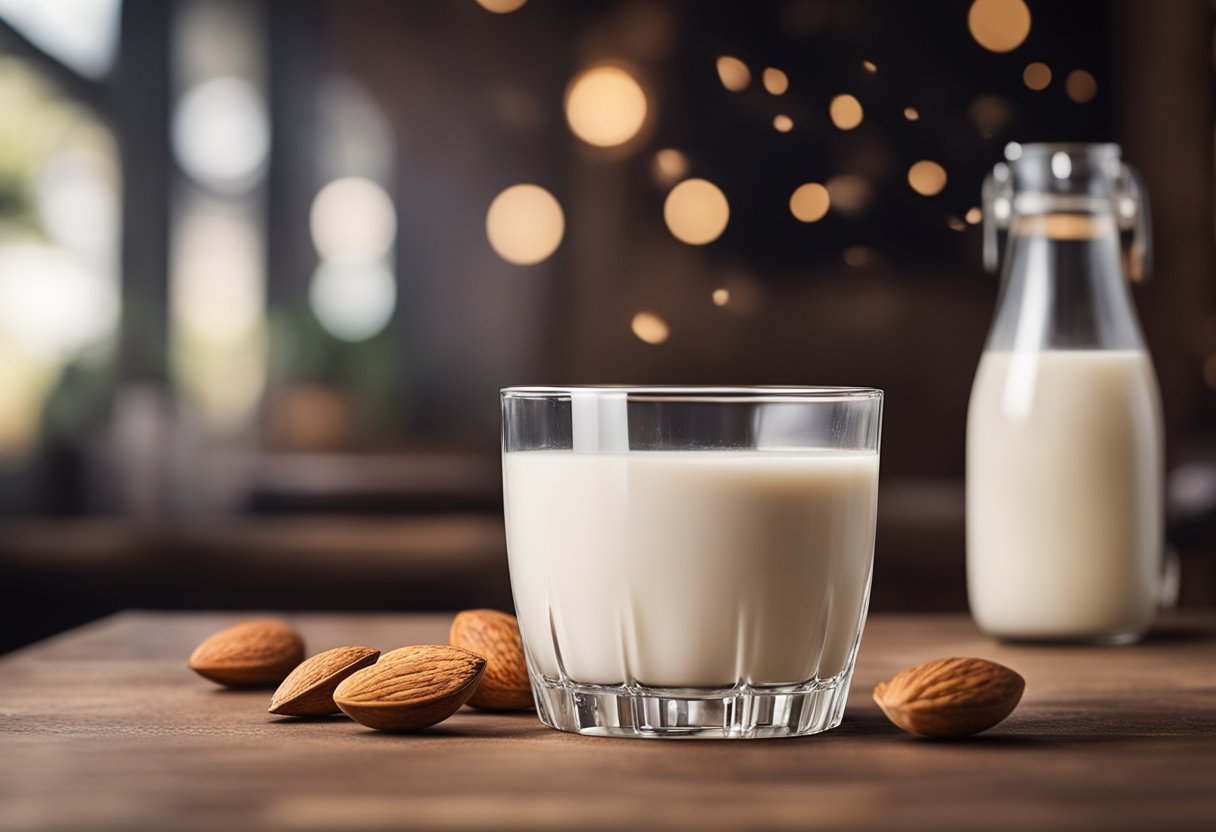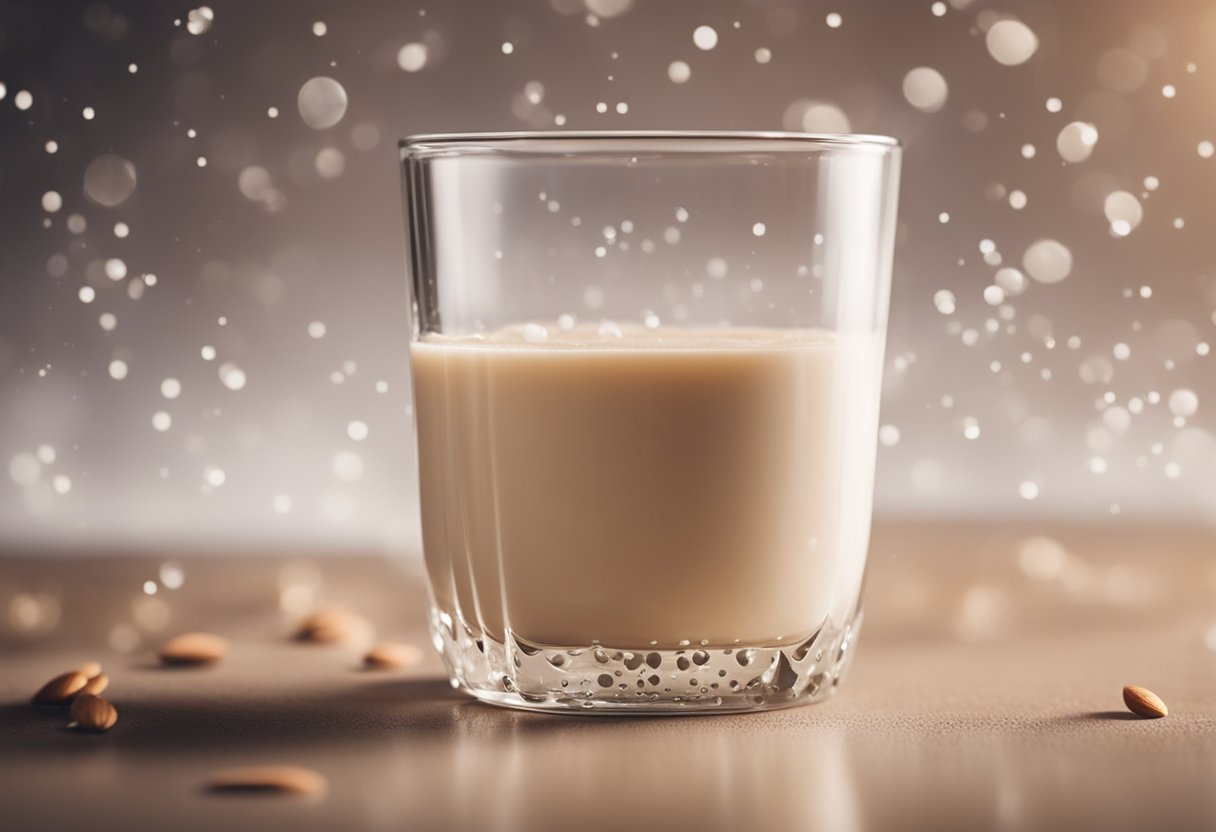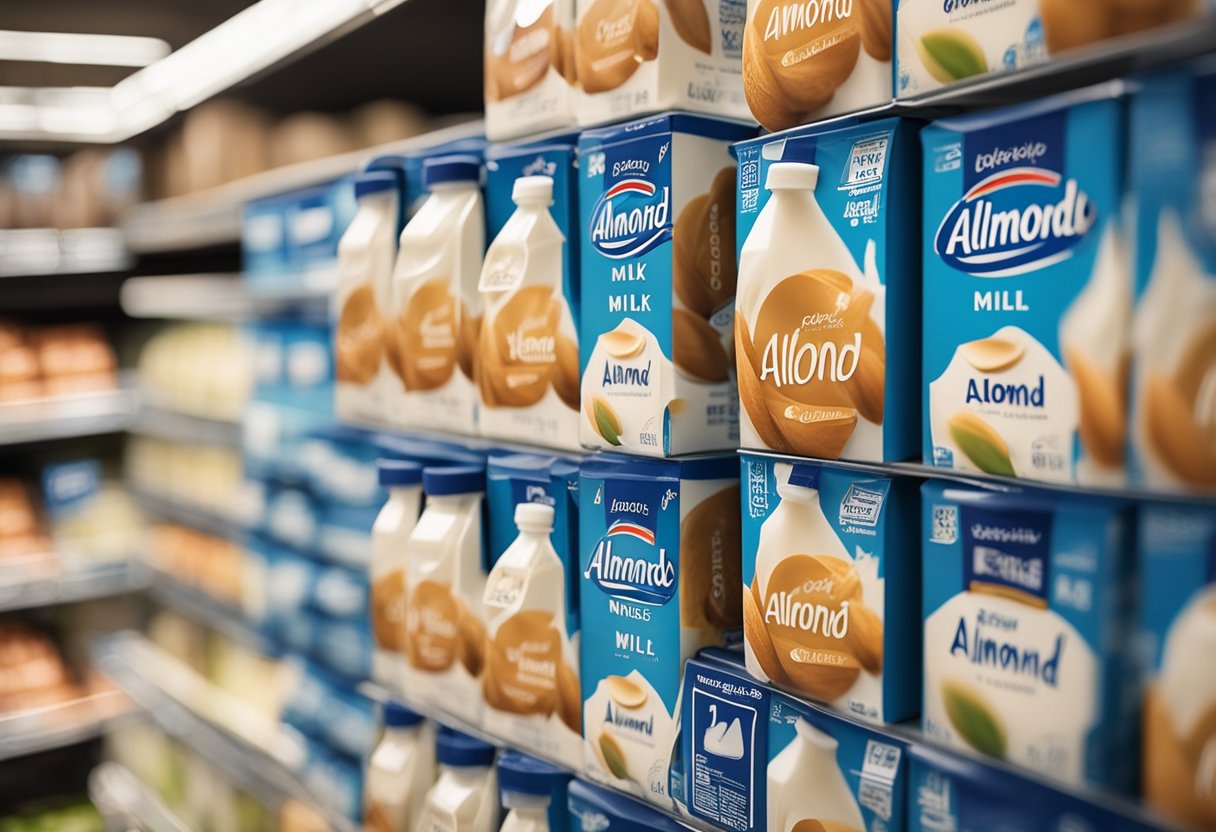I have always been curious about the taste of almond milk. As a milk alternative, it has gained immense popularity in recent years. But what does almond milk actually taste like?
Is it sweet or nutty? Does it taste like cow’s milk? In this article, I will explore the taste of almond milk and answer some common questions about this popular dairy-free alternative.

Understanding Almond Milk Almond milk is a plant-based milk that is made by blending almonds and water. It is naturally dairy-free, lactose-free, and vegan-friendly.
Almond milk is a popular choice for people who are lactose intolerant, have a milk allergy, or follow a vegan or plant-based diet.
Tasting Almond Milk Almond milk has a nutty and slightly sweet taste with a subtle hint of almond flavor. It is lighter and less creamy than cow’s milk, and has a thinner consistency. The taste of almond milk can vary depending on the brand and whether it is sweetened or unsweetened.
Some people find the taste of almond milk to be too different from cow’s milk, while others prefer it as a lighter and refreshing alternative.
Key Takeaways
- Almond milk has a nutty and slightly sweet taste with a subtle hint of almond flavor.
- It is a popular dairy-free alternative for people who are lactose intolerant, have a milk allergy, or follow a vegan or plant-based diet.
- The taste of almond milk can vary depending on the brand and whether it is sweetened or unsweetened.
Understanding Almond Milk

As a non-dairy, plant-based milk alternative, almond milk has become increasingly popular in recent years. But what does almond milk actually taste like?
Almond milk has a nutty and slightly sweet taste with a subtle hint of almond flavor. It’s a light and refreshing drink that has a creamy texture but is not as thick as dairy milk. Some almond milk brands add thickeners like carrageenan to mimic dairy milk’s texture.
One of the benefits of almond milk is that it is lactose-free, making it a great option for those who are lactose intolerant. It is also lower in calories than dairy milk and is often fortified with vitamins and minerals like calcium, vitamin D, and vitamin E.
It is important to note that not all almond milk brands are created equal. Some brands may add sweeteners or other flavorings, while others may use different methods for processing the almonds, resulting in varying tastes and textures.
It is always a good idea to read the label and choose a brand that aligns with your preferences and dietary needs.
In summary, almond milk has a nutty and slightly sweet taste with a creamy texture. It is a great alternative to dairy milk for those who are lactose intolerant or looking to reduce their calorie intake. When choosing a brand, be sure to read the label and choose one that aligns with your preferences and dietary needs.
Tasting Almond Milk
I recently tried almond milk for the first time and was curious about what it would taste like. Here’s what I found:
- Flavor: Almond milk has a distinct taste that is different from cow’s milk. It has a nutty flavor that is not overpowering but definitely noticeable. It also has a natural sweetness to it.
- Sweetness: The sweetness of almond milk can vary depending on whether it is sweetened or unsweetened. Sweetened versions can range from just being sweetened almond milk to something like vanilla, cinnamon, or even chocolate. Unsweetened versions still have a natural sweetness but are not as sweet as the sweetened versions.
- Texture: Almond milk has a thinner, more watery consistency than cow’s milk. It is not as creamy but still has a smooth texture.
- Overall: I found that almond milk has a pleasant taste and is a good alternative to cow’s milk for those who are lactose intolerant or vegan. It may take some getting used to if you are used to the taste of cow’s milk, but it is definitely worth a try.
In conclusion, almond milk has a distinct taste and texture that may take some getting used to, but it is a good alternative to cow’s milk for those who are lactose intolerant or vegan.
The sweetness can vary depending on whether it is sweetened or unsweetened, and it has a natural nutty flavor. Overall, I would recommend giving it a try to see if it is a good fit for your taste preferences.
Texture of Almond Milk

Almond milk has a unique texture that sets it apart from other types of milk. It has a creamy and silky texture that is similar to cow’s milk. This makes it a great option for lattes or other beverages.
However, almond milk is not as thick as dairy milk. Some almond milk brands add thickeners like carrageenan to mimic dairy milk’s texture.
Compared to skim milk, almond milk’s consistency is more akin to skim milk’s watery profile than the richer texture of 2% or whole dairy milk. However, almond milk is less sweet than skim milk with its own distinct flavor.
It’s essential to note that the texture of almond milk can vary depending on the brand and whether or not it’s homemade. Homemade almond milk tends to be thinner and less creamy than store-bought almond milk.
This is because store-bought almond milk often contains added thickeners and emulsifiers to improve its texture and mouthfeel.
Overall, almond milk has a smooth and light texture that is easy to drink and use in recipes. Its creamy and silky texture makes it a great alternative to dairy milk in lattes, smoothies, and other beverages.
Almond Milk and Dietary Restrictions

As a lactose intolerant individual, finding a milk alternative that is both tasty and nutritious can be a challenge. Fortunately, almond milk is a great option for those with dietary restrictions.
Firstly, almond milk is vegan-friendly, making it an excellent choice for those who follow a plant-based diet. It is made from ground almonds and water, making it a naturally dairy-free and lactose-free option.
Moreover, almond milk is a suitable alternative for individuals with lactose intolerance. Lactose intolerance is a common condition where the body cannot digest lactose, a sugar found in milk and dairy products.
Almond milk is lactose-free, making it a great alternative for those who experience discomfort after consuming dairy products.
Almond milk is also soy-free, which is beneficial for individuals who have a soy allergy or sensitivity. Soy is a common ingredient in many milk alternatives, but almond milk is made solely from almonds and water, making it a safe option for those with soy allergies.
In addition to being a great alternative for individuals with dietary restrictions, almond milk is also packed with nutrients. It is a good source of vitamin E, magnesium, and potassium, making it a healthy addition to any diet.
Overall, almond milk is an excellent option for those with dietary restrictions, including vegans, individuals with lactose intolerance, and those with soy allergies. It is a nutritious and delicious milk alternative that can be used in a variety of recipes, from smoothies to baked goods.
Nutritional Value of Almond Milk

Almond milk is a popular plant-based milk alternative that is naturally dairy-free and lactose-free. It is made by blending almonds with water and straining the mixture to remove the solids.
Almond milk has a creamy texture and a mild, nutty flavor that makes it a great addition to smoothies, coffee, and cereal.
Here is a breakdown of the nutritional value of almond milk:
Protein
Almond milk is not a significant source of protein. One cup (240 ml) of unsweetened almond milk contains only 1 gram of protein. If you are looking to increase your protein intake, almond milk may not be the best option.
Fat
Almond milk is lower in fat than cow’s milk. One cup of unsweetened almond milk contains about 2.5 grams of fat, while one cup of whole cow’s milk contains about 8 grams of fat. Almond milk is also lower in saturated fat than cow’s milk.
Calcium
Many brands of almond milk are fortified with calcium, making it a good source of this important mineral. One cup of fortified almond milk can provide up to 45% of your daily recommended intake of calcium.
Calories
Unsweetened almond milk is lower in calories than cow’s milk. One cup of unsweetened almond milk contains only 30-40 calories, while one cup of whole cow’s milk contains about 150 calories.
Vitamins
Almond milk is a good source of vitamin E, a powerful antioxidant that helps protect your cells from damage. One cup of unsweetened almond milk contains about 15% of your daily recommended intake of vitamin E.
Magnesium
Almond milk is also a good source of magnesium, a mineral that is important for bone health and muscle function. One cup of unsweetened almond milk contains about 7% of your daily recommended intake of magnesium.
Overall, almond milk is a nutritious and tasty alternative to cow’s milk. It is lower in fat and calories and contains important nutrients like calcium, vitamin E, and magnesium.
Almond Milk in Beverages

As a non-dairy alternative to cow’s milk, almond milk has become a popular choice for those who are lactose intolerant or vegan. But how does it taste in beverages?
When it comes to coffee, almond milk can be a great addition for those who prefer a nuttier taste to their morning cup of joe. However, it’s important to note that almond milk may not froth as well as dairy milk, which can affect the texture of specialty drinks like cappuccinos and lattes.
In tea, almond milk can add a slightly sweet and nutty taste, making it a great option for those who prefer a creamier texture in their tea. It’s important to note that the flavor of almond milk can vary depending on the brand and whether it’s sweetened or unsweetened.
For those who enjoy milkshakes, almond milk can be a great alternative to dairy milk. It adds a nutty flavor that can complement a variety of flavors, including chocolate and vanilla. However, it’s important to note that almond milk may not be as thick as dairy milk, which can affect the overall texture of the milkshake.
Overall, almond milk can be a great addition to a variety of beverages, but it’s important to keep in mind that its flavor and texture may differ from dairy milk. It’s always a good idea to experiment with different brands and types of almond milk to find the one that best suits your taste preferences.
Almond Milk in Recipes
As a vegan alternative to dairy milk, almond milk is a versatile ingredient that can be used in many recipes. Here are some examples of how to use almond milk in your cooking:
Cereal
Almond milk is a great choice for cereal because it has a creamy texture and a slightly sweet taste. It can be used in both hot and cold cereal, and it pairs well with a variety of toppings, such as fruit, nuts, and seeds.
Smoothies
Almond milk is a popular choice for smoothies because it adds a creamy texture and a nutty flavor. It can be used as a base for smoothies, or it can be added to other ingredients to create a unique flavor. Almond milk pairs well with fruits, vegetables, and protein powders.
Baked Goods
Almond milk can be used in baked goods as a substitute for dairy milk. It works well in recipes that call for milk, such as cakes, muffins, and breads. Almond milk can also be used in savory baked goods, such as quiches and casseroles.
Almond Milk in Recipes
Almond milk can be used in a variety of recipes, both sweet and savory. It can be used as a substitute for dairy milk in recipes such as soups, sauces, and dressings.
Almond milk can also be used in recipes that call for cream or butter, such as pasta sauces and mashed potatoes.
Dressings
Almond milk can be used as a base for dressings, such as ranch or Caesar dressing. It can also be used in vinaigrettes, where it adds a creamy texture and a nutty flavor.
Almond milk can be used in both sweet and savory dressings, and it pairs well with a variety of ingredients, such as herbs, spices, and citrus.
Overall, almond milk is a versatile ingredient that can be used in a variety of recipes. It adds a nutty flavor and a creamy texture, making it a great choice for both sweet and savory dishes.
Choosing Almond Milk Brands

When it comes to choosing almond milk brands, there are a few factors to consider. Here are some key things to keep in mind:
1. Ingredients
One of the most important things to look for when choosing an almond milk brand is the ingredients list. Some brands may contain additives like carrageenan, which has been linked to digestive issues in some people.
Others may contain added sugars or flavorings that can affect the taste and nutritional profile of the milk. Look for brands that use simple, whole-food ingredients like almonds, water, and salt.
2. Nutritional Profile
Almond milk can be a good source of nutrients like calcium, vitamin E, and healthy fats. However, not all brands are created equal in terms of their nutritional profile.
Some may be fortified with additional vitamins and minerals, while others may contain more or less protein and fat. Check the nutrition label to make sure you’re getting the nutrients you need.
3. Taste and Texture
Of course, taste and texture are important factors to consider as well. Some almond milk brands may have a stronger almond flavor than others, while some may be thinner or thicker in texture.
Experiment with different brands to find one that suits your taste preferences and works well in your favorite recipes.
4. Brand Reputation
Finally, consider the reputation of the brand you’re considering. Some brands may have a history of producing high-quality, reliable products, while others may have a less-than-stellar reputation. Look for brands that have a good track record and positive reviews from other consumers.
Whether you’re buying almond milk at the grocery store or making your own at home, keeping these factors in mind can help you choose a brand that fits your needs and tastes great.
And if you’re looking for a high-quality almond milk to use in your favorite coffee drinks, many coffee shops now offer almond milk as a dairy-free alternative.
Storing Almond Milk

As with any food or drink, proper storage can affect the taste and quality of almond milk. Here are some tips for storing almond milk:
Unopened Almond Milk
Unopened almond milk can be stored at room temperature until the expiration date on the package. However, it is recommended to store it in the refrigerator to extend its shelf life.
If you plan to store unopened almond milk in the refrigerator, make sure to place it in the main compartment of the fridge and not in the door. The temperature in the door fluctuates more than the main compartment, which can cause the almond milk to spoil faster.
Opened Almond Milk
Once opened, almond milk should be stored in the refrigerator. It is important to keep it in an airtight container to prevent it from absorbing any odors or flavors from other foods in the fridge.
Make sure to check the expiration date on the package and use the almond milk before it goes bad. Generally, opened almond milk can last for 7-10 days in the refrigerator.
Freezing Almond Milk
If you have leftover almond milk that you won’t be able to use before it goes bad, consider freezing it. Almond milk can be frozen for up to 6 months, but the texture may change slightly after thawing.
To freeze almond milk, pour it into an airtight container, leaving some room at the top for expansion. Label the container with the date and store it in the freezer. When you’re ready to use it, thaw it in the refrigerator overnight.
Conclusion
Proper storage is important for maintaining the taste and quality of almond milk. Whether unopened or opened, make sure to store almond milk in the refrigerator. If you have leftover almond milk, consider freezing it for later use.
Health Benefits of Almond Milk
As someone who regularly consumes almond milk, I can attest to the numerous health benefits it provides. Here are some of the benefits of drinking almond milk:
- Low in calories: Almond milk is low in calories, making it a great option for those who are trying to lose weight or maintain a healthy weight.
- Low in sugar: Unlike cow’s milk, almond milk is naturally low in sugar, making it a great option for those who are watching their sugar intake.
- Heart-healthy: Almond milk is rich in healthy fats, such as monounsaturated and polyunsaturated fats, which are good for your heart. These fats can help lower your cholesterol levels and reduce your risk of heart disease.
- Blood sugar control: Almond milk is low in carbohydrates, making it a great option for those who are trying to control their blood sugar levels. It is also rich in magnesium, which can help regulate blood sugar levels.
- Rich in vitamins and minerals: Almond milk is rich in vitamins and minerals, such as vitamin E, calcium, and potassium. These nutrients are essential for maintaining good health.
Overall, almond milk is a great alternative to cow’s milk for those who are looking for a healthier option. It provides numerous health benefits and is a great source of essential nutrients.
Almond Milk vs Other Milk Alternatives
When it comes to milk alternatives, there are numerous options to choose from. However, not all milk alternatives are created equal. In this section, I will compare almond milk with some of the other popular milk alternatives.
Dairy Milk
Dairy milk is the most common type of milk consumed worldwide. It is made from cow’s milk and is a rich source of calcium and vitamin D. However, it is also high in calories, saturated fat, and cholesterol. For those who are lactose intolerant or have a milk allergy, dairy milk is not an option.
Soy Milk
Soy milk is made from soybeans and is a popular milk alternative. It is high in protein and is a good source of calcium. Soy milk has a creamy texture and a slightly nutty flavor. However, some people do not like the taste of soy milk, and it may not be suitable for those with soy allergies.
Coconut Milk
Coconut milk is made from the flesh of coconuts and has a rich, creamy texture. It is a good source of medium-chain triglycerides (MCTs) and is lower in calories than dairy milk. However, coconut milk is high in saturated fat, which may not be suitable for those with high cholesterol.
Oat Milk
Oat milk is made from oats and has a creamy texture and a slightly sweet flavor. It is a good source of fiber and is lower in fat than dairy milk. However, oat milk is not suitable for those with gluten allergies, as it may contain traces of gluten.
Milk Alternatives
There are many other milk alternatives available, such as rice milk, hemp milk, and pea milk. Each of these milk alternatives has its own unique taste and nutritional profile. It is important to choose a milk alternative that suits your taste preferences and nutritional needs.
In summary, almond milk is a popular milk alternative that is low in calories, high in vitamin E, and has a nutty flavor. While there are other milk alternatives available, each has its own unique taste and nutritional profile. It is important to choose a milk alternative that suits your taste preferences and nutritional needs.
Frequently Asked Questions
Does unsweetened almond milk taste like regular milk?
No, unsweetened almond milk does not taste like regular milk. It has a nutty flavor that sets it apart from regular cow’s milk. Almond milk is also thinner and has a slightly grainy texture compared to regular milk.
Why does almond milk taste like water?
Some people may find that almond milk tastes like water because it has a thinner consistency than regular milk. Additionally, some brands may dilute their almond milk with water to make it more affordable.
Is almond milk sweeter than regular milk?
Almond milk is naturally sweeter than regular milk, but it is not as sweet as flavored milk. Sweetened almond milk can vary from being just sweetened almond milk to something like vanilla, cinnamon, or even chocolate.
What does vanilla almond milk taste like?
Vanilla almond milk has a sweet and creamy flavor with a hint of vanilla. It is a popular flavor of almond milk and can be used in coffee, smoothies, and even boba tea.
What does cashew milk taste like?
Cashew milk has a creamy and nutty flavor that is similar to almond milk. It is slightly sweeter than almond milk and has a smooth texture.
Does almond milk taste good?
The taste of almond milk is subjective and varies from person to person. Some people enjoy the nutty flavor and slightly sweet taste, while others may find it too thin or watery. It is best to try different brands and flavors to determine if almond milk is a good fit for your taste buds.







